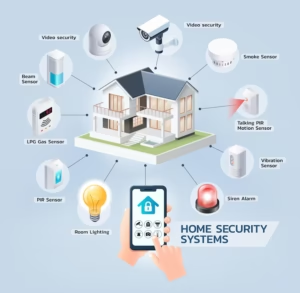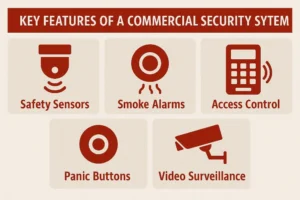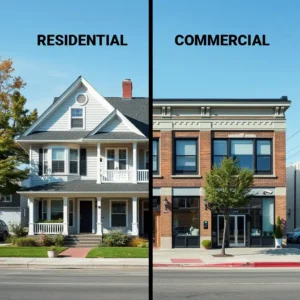What is a Residential Security System?
Choosing between a Home Vs Commercial Security System is one of the most important decisions for protecting your property, assets, and people.
A residential security system is design to protect homeowners and their families from threats such as burglary, fire and carbon monoxide poisoning. Its primary goals are:
Deter intruders
Detect unauthorized entry
Alert homeowners in real time
Core Components of a Home Security System
Most residential security systems include the following:
Door and window sensors – Trigger an alarm when opened unexpectedly
Motion detectors – Detect movement inside the home
Control panel – The central brain of the system
Alarm siren – Alerts neighbors and scares away intruders
Panic buttons – Emergency alert devices
Security cameras – Provide live video monitoring
Many modern home systems also offer:
Remote monitoring via smartphone
Smart home integration (locks, lights, thermostats)
Fire and carbon monoxide monitoring
Cloud video storage
What is a Commercial Security System?
A commercial security system is designed for businesses, offices, warehouses, retail stores, and industrial facilities. These systems are more advanced, scalable, and customized compared to home security systems.
Key Components of a Commercial Security System
A business security system often includes:
Access control systems (keycards, biometrics, facial recognition)
Intrusion detection sensors (doors, windows, glass-break detectors)
High-resolution IP surveillance cameras
Fire alarms and sprinkler systems
Environmental monitoring (temperature, smoke, water leaks)
Panic buttons in key locations
Commercial systems are designed to:
Protect assets and inventory
Monitor employee activity
Prevent theft and fraud
Ensure workplace safety
Provide legal evidence if needed
Most commercial security systems integrate with:
Building management systems
Cloud-based video storage
AI-powered analytics
Central monitoring stations
Differences Between Home and Commercial Systems
| Feature | Home Security System | Commercial Security System |
|---|---|---|
| Purpose | Protect family & property | Protect business & assets |
| Scale | Small | Large |
| Cameras | Few cameras | Many cameras |
| Monitoring | Self-monitoring | Professional monitoring |
| AI features | Limited | Advanced AI analytics |
| Installation | DIY possible | Professional required |
| Cost | Lower | Higher |
| Storage | Mostly cloud | Cloud + local NVR |
| Remote access | Yes | Yes (advanced) |
| Cybersecurity | Basic | Enterprise-level |
Why Do Business and Home Owners Install Cameras?
There are several reasons why both business and home owners choose to install cameras:
1. Crime Deterrence
Visible cameras discourage burglars, vandals, and shoplifters.
2. Real-Time Monitoring
Business owners can monitor multiple locations remotely from anywhere in the world.
3. Evidence Collection
Security footage helps police solve crimes and resolve disputes.
4. Employee Safety
Cameras help prevent workplace accidents and improve compliance with safety rules.
5. Peace of Mind
Knowing your property is protected reduces stress and anxiety.
Home Security Laws vs. Commercial Security Laws
The laws governing home security systems and commercial security systems vary depending on the jurisdiction. However, there are some general differences between the two types of systems:
Residential Security Laws
Cameras cannot be placed in bathrooms or bedrooms
Audio recording may require consent
Public surveillance may be restricted
Commercial Security Laws
Businesses can monitor common areas
Employee monitoring must be disclosed
Certain industries (banks, hospitals) require strict compliance
Can You Use a Home Security System in a Business?
Yes, but with limitations.
A home security system can work for very small businesses, such as:
Small retail shops
Home offices
Boutique stores
However, as your business grows, you will likely need a commercial-grade system for better reliability, scalability, and security intelligence.
Best Residential Security Systems for a Small Business
If you are running a small business, here are some good options:
Ring Alarm – Affordable and scalable
SimpliSafe – Easy to install
ADT Control – Professional monitoring
Vivint – Smart home integration
Nest Secure – Smart security ecosystem
For larger businesses, Secure IT Global recommends professional IP camera systems from brands like Hanwha Vision, Uniview, Dahua, and Montavue.
Choosing between a home and commercial security system depends on your needs, budget, and property type.
We specialize in:
Residential security camera installation
Business video surveillance systems
AI-powered analytics
Remote monitoring solutions
Custom security design
👉 Contact with us to build a security system that protects what matters most.
Your safety is our priority.
Secure IT Global LLC
New York, NY
(888) 902 2303
customerservice@secureitglobal.com









